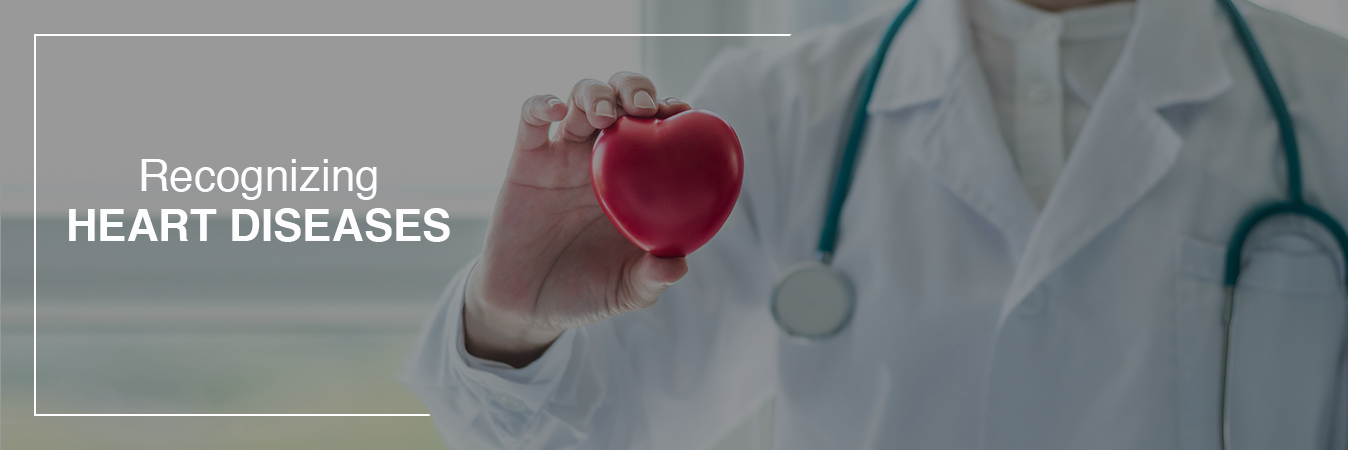Recognizing heart diseases
Heart disease constitute a range of conditions that affect your heart.
Symptoms of heart disease due to block in your blood vessels (atherosclerotic disease)
Cardiovascular disease is caused by narrowed, blocked or stiffened blood vessels that prevent your heart, brain or other parts of your body from receiving enough blood.
Symptoms can include:
- Chest pain (angina)
- Shortness of breath
- Pain, numbness, weakness or coldness in your legs or arms if the blood vessels in those parts of your body are narrowed
- Pain in the neck, jaw, throat, upper abdomen or back
Heart disease symptoms caused by abnormal heartbeats (heart arrhythmias)
A heart arrhythmia is an abnormal heartbeat. Your heart may beat too quickly, too slowly or irregularly. Heart arrhythmia symptoms can include:
- Fluttering in your chest
- Racing heartbeat (tachycardia)
- Slow heartbeat (bradycardia)
- Chest pain or discomfort
- Shortness of breath
- Lightheadedness
- Dizziness
- Fainting (syncope) or near fainting
Heart disease symptoms caused by heart defects
Serious congenital heart defects — defects you’re born with — usually become evident soon after birth. Heart defect symptoms in children could include:
- Pale gray or blue skin color (cyanosis)
- Swelling in the legs, abdomen or areas around the eyes
- In an infant, shortness of breath during feedings, leading to poor weight gain.
Heart disease symptoms caused by weak heart muscle (dilated cardiomyopathy)
Cardiomyopathy is the thickening and weakening of heart muscle. In early stages of cardiomyopathy, you may have no symptoms. As the condition worsens, symptoms may include:
- Breathlessness with exertion or at rest
- Swelling of the legs, ankles and feet
- Fatigue
- Irregular heartbeats that feel rapid, pounding or fluttering
- Dizziness, lightheadedness and fainting
Heart disease symptoms caused by heart infections
There are three types of heart infections:
- Pericarditis, which affects the tissue surrounding the heart (pericardium)
- Myocarditis, which affects the muscular middle layer of the walls of the heart (myocardium)
- Endocarditis, which affects the inner membrane that separates the chambers and valves of the heart (endocardium)
Varying slightly with each type of infection, heart infection symptoms can include:
- Fever
- Shortness of breath
- Weakness or fatigue
- Swelling in your legs or abdomen
- Changes in your heart rhythm
- Dry or persistent cough
- Skin rashes or unusual spots
Heart disease symptoms caused by valvular heart disease
The heart has four valves — the aortic, mitral, pulmonary and tricuspid valves — that open and close to direct blood flow through your heart. Valves may be damaged by a variety of conditions leading to narrowing (stenosis), leaking (regurgitation or insufficiency) or improper closing (prolapse).
Depending on which valve isn’t working properly, valvular heart disease symptoms generally include:
- Fatigue
- Shortness of breath
- Irregular heartbeat
- Swollen feet or ankles
- Chest pain
- Fainting (syncope)
When to see a doctor
Seek emergency medical care if you have these heart disease symptoms:
- Chest pain
- Shortness of breath
- Fainting
Heart disease is easier to treat when detected early, so talk to your doctor about your concerns about your heart health. If you’re concerned about developing heart disease, talk to your doctor about steps you can take to reduce your heart disease risk. This is especially important if you have a family history of heart disease.


